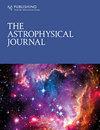An X-Ray Census of Fast Radio Burst Host Galaxies: Constraints on Active Galactic Nuclei and X-Ray Counterparts
IF 5.4
2区 物理与天体物理
Q1 ASTRONOMY & ASTROPHYSICS
引用次数: 1
Abstract
Abstract We present the first X-ray census of fast radio burst (FRB) host galaxies to conduct the deepest search for active galactic nuclei (AGN) and X-ray counterparts to date. Our sample includes seven well-localized FRBs with unambiguous host associations and existing deep Chandra observations, including two events for which we present new observations. We find evidence for AGN in two FRB host galaxies based on the presence of X-ray emission coincident with their centers, including the detection of a luminous ( L X ≈ 5 × 10 42 erg s −1 ) X-ray source at the nucleus of FRB 20190608B’s host, for which we infer an SMBH mass of M BH ∼ 10 8 M ⊙ and an Eddington ratio L bol / L Edd ≈ 0.02, characteristic of geometrically thin disks in Seyfert galaxies. We also report nebular emission-line fluxes for 24 highly secure FRB hosts (including 10 hosts for the first time), and assess their placement on a BPT diagram, finding that FRB hosts trace the underlying galaxy population. We further find that the hosts of repeating FRBs are not confined to the star-forming locus, contrary to previous findings. Finally, we place constraints on associated X-ray counterparts to FRBs in the context of ultraluminous X-ray sources (ULXs), and find that existing X-ray limits for FRBs rule out ULXs brighter than L X ≳ 10 40 erg s −1 . Leveraging the CHIME/FRB catalog and existing ULX catalogs, we search for spatially coincident ULX–FRB pairs. We identify a total of 28 ULXs spatially coincident with the localization regions for 17 FRBs, but find that the DM-inferred redshifts for the FRBs are inconsistent with the ULX redshifts, disfavoring an association between these specific ULX–FRB pairs.快速射电暴宿主星系的x射线普查:对活动星系核和x射线对应体的约束
摘要:我们提出了快速射电暴(FRB)宿主星系的第一次x射线普查,以进行迄今为止最深的活动星系核(AGN)和x射线对应体的搜索。我们的样本包括7个定位良好的快速射电暴,它们具有明确的宿主关联和现有的深层钱德拉观测结果,其中包括我们提出新观测结果的两个事件。我们发现证据AGN美联储在两个宿主星系基于X射线辐射的存在与他们的中心重合,包括发光的检测(L X≈5×10的42 erg年代−1)X射线源在美联储的核心20190608 b的主机,我们推断形成超大质量黑洞的质量M BH∼10 8 M⊙和爱丁顿波尔/ L比值L Edd≈0.02,赛弗特星系星系中几何薄圆盘的特征。我们还报告了24个高度安全的快速射电暴宿主(包括首次发现的10个宿主)的星云发射线通量,并评估了它们在BPT图上的位置,发现快速射电暴宿主追踪了潜在的星系群。我们进一步发现,重复快速射电暴的宿主并不局限于恒星形成的轨迹,这与之前的发现相反。最后,我们在超亮X射线源(ULXs)的背景下对快速射电暴的相关X射线对应物进行了限制,并发现现有的快速射电暴X射线限制排除了比LX≥10 40 erg s−1亮的ulx。利用CHIME/FRB目录和现有的ULX目录,我们搜索空间上一致的ULX - FRB对。我们共发现了28个ULX在空间上与17个快速射电暴的定位区域一致,但发现dm推断的快速射电暴红移与ULX红移不一致,不利于这些特定的ULX - frb对之间的关联。
本文章由计算机程序翻译,如有差异,请以英文原文为准。
求助全文
约1分钟内获得全文
求助全文
来源期刊

Astrophysical Journal
地学天文-天文与天体物理
CiteScore
8.40
自引率
30.60%
发文量
2854
审稿时长
1 months
期刊介绍:
The Astrophysical Journal is the foremost research journal in the world devoted to recent developments, discoveries, and theories in astronomy and astrophysics.
 求助内容:
求助内容: 应助结果提醒方式:
应助结果提醒方式:


